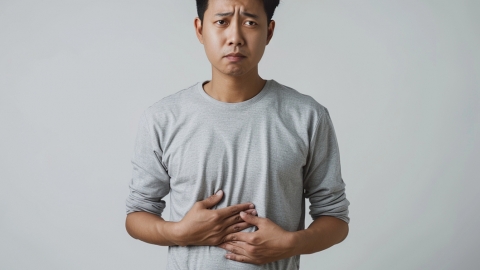What causes persistent hiccups?
Generally, persistent hiccups may be caused by eating too quickly, emotional fluctuations, electrolyte imbalance, gastroesophageal reflux, gastritis, and other factors. Symptomatic management through general treatments, medication, and other methods is recommended. If experiencing any physical discomfort, one should seek medical examination and treatment at a hospital as early as possible. Detailed explanations are as follows:

1. Eating Too Quickly
When eating too quickly, food and air enter the stomach together, causing the stomach to expand and stimulate the diaphragm. The contraction of the diaphragm triggers the hiccup reflex, which may be accompanied by bloating and stomach discomfort. It is recommended to slow down the eating pace, chew food thoroughly, and avoid swallowing large amounts of air.
2. Emotional Fluctuations
When emotionally excited or stressed, breathing patterns may change, leading to excessive air intake and triggering hiccups. This may be accompanied by symptoms such as anxiety, palpitations, and sweating. Practicing deep breathing exercises and relaxation techniques, such as meditation and yoga, can help regulate breathing and relieve emotional stress.
3. Electrolyte Imbalance
Prolonged malnutrition or an unbalanced diet may cause electrolyte imbalance. This condition can affect normal metabolism and nerve function, leading to the accumulation of metabolic products like blood ammonia in the body, which may stimulate the central nervous system and cause hiccups. Symptoms may also include fatigue, muscle spasms, and arrhythmia. It is recommended to follow medical advice and use medications such as sodium chloride solution, tolvaptan capsules, and sodium bicarbonate tablets to alleviate symptoms.
4. Gastroesophageal Reflux
Gastroesophageal reflux mainly results from dysfunction of the lower esophageal sphincter or excessive gastric acid secretion, causing stomach contents to flow back into the esophagus. This irritates the esophageal mucosa and the diaphragm, leading to hiccups. Symptoms may include heartburn, acid regurgitation, and chest pain. Under a doctor's guidance, medications such as omeprazole enteric-coated capsules, cimetidine tablets, and cisapride tablets may be used to relieve discomfort.
5. Gastritis
Gastritis is primarily caused by Helicobacter pylori infection, drug-induced irritation, poor dietary habits, and other factors. Gastritis damages the gastric mucosa, affecting gastric motility and emptying function, which prevents gas in the stomach from being expelled smoothly, thereby stimulating the diaphragm and causing hiccups. Symptoms may include upper abdominal pain, bloating, nausea, and others. Patients should take medications such as复合消化酶胶囊 (combined digestive enzyme capsules), 枸橼酸铋钾片 (bismuth potassium citrate tablets), and 胶体果胶铋胶囊 (colloidal bismuth pectin capsules) under medical guidance.
In daily life, attention should be paid to dietary hygiene and regular eating habits. Overeating and consuming irritating foods should be avoided to prevent physical discomfort.







